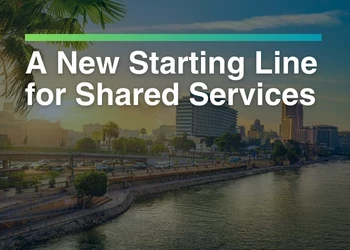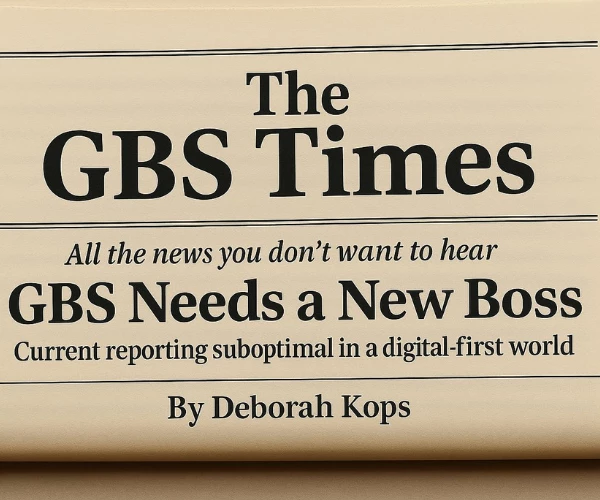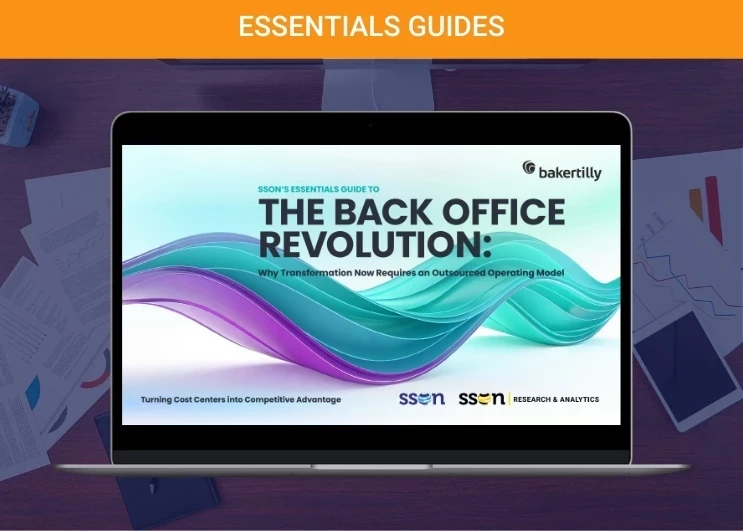New Report: The Future of GBS is Digital
Global business services as a powerful transformation engine
Add bookmark
We respect your privacy, by clicking "Download Your Copy" you agree to having your details passed onto the sponsor who may promote similar products and services related to your area of interest subject to their privacy policy. You have the right to object. In addition, you will receive our e-newsletter, including information on related online learning opportunities. For further information on how we process and monitor your personal data, and information about your privacy and opt-out rights, click here. Download PDF Attachment
[Note: you can download a PDF version of this article via the button above.]
Introduction
Continuous cost pressure, increasing market volatility, technology-driven disruptions and globally connected value chains are forcing companies to further professionalize their support functions. The worst effects of the COVID-19 pandemic seem, hopefully, to be coming to an end soon. However, from very early on, the pandemic accelerated these trends and triggered substantial changes in how GBS organizations will operate in the future.
Historically, organizations transferred transactional, repetitive, process-based work to shared service centers, which have evolved into today’s Global Business Services (GBS). Their remit has remained as being the backbone of efficiency, driving standardization and cost gains – but for many organizations they are also the engines of transformation for the entire business. Functions come to GBS for help in exploring and delivering innovation, automation, advanced services and new ways of working.
Because the pandemic had unforeseen influences on the operating model for both organizations and their GBS, BCG, EY and SSON consulted over 140 organizations in a global survey to understand how GBS organizations managed the crisis, and how it affects their future.
In this report, we will see that GBS strengthened its role as a key pillar of resilience during the recent crisis, and will understand its ambitions to further enhance its role to become more digital-oriented, value-focused and customer-centric.
However, there is also a clear need to build on core capabilities in order to advance its future position.
Note: you can download a PDF version of this article via the button above.
GBS has proven itself as a key pillar for the organization’s resilience
Organizations across the globe saw massive disruption to their working norms during the COVID-19 pandemic. But this did not seem to affect GBS organizations negatively. Only 1% reported a drop in productivity, versus 13% of organizations with no GBS whose productivity was impacted very poorly.
"Only 1% [of GBS] reported a drop in productivity, versus 13% of organizations with no GBS whose productivity was impacted very poorly."
In fact, GBS organizations rose to the challenge and really came into their own: for nearly 50% of the survey respondents, productivity was unaffected, and for 38% productivity actually increased. One explanation is that employees worked longer hours in their home offices. But there are further key reasons why GBS contributed significantly: processes did not break despite being executed remotely because they are refined and uniform. Business continuity plans were tested and in place within GBS. Also, some GBS locations took over jobs from sites that were heavily affected by COVID 19, for example European sites supported some locations in Asia during the first months of the pandemic – one advantage of truly global organizations.
Crystallized: the future focus of GBS
Even without the pandemic, the world is changing fast: global value chains, increasingly demanding customer expectations, accelerated introduction of new technologies and distributed working models are putting pressure on companies. GBS organizations will need to change their operating models to excel in this environment, and according to our study GBS leaders envision four key characteristics that will shape its evolution:
- GBS will continue to focus on performance
- It will begin to shift radically to increased digitalization
- It will focus much more on delivering value
- And it will push forward the organization’s efforts to be more customer-centric
However, these future priorities are shaped by GBS organizations’ footprint and experience today. For example, more mature GBS entities which are usually larger, and host offshore locations are likely to be more focused on customer-centricity and value-delivery than smaller ones. These usually less-advanced GBS organizations will still focus more on performance as a ‘table stake’ priority.
Beyond these four future characteristics, comparatively few GBS identify their future role as either entrepreneurial or as true ecosystem orchestrators yet; there are some GBS organizations at the vanguard of these areas, but they have not yet reached the mainstream.
Making the future real: five key capabilities to build
We asked what capabilities GBS organizations need to help evolve their future roles. Five major topic clusters emerged: technology enablers, advanced service offerings, new ways of working, a future-oriented setup, and how GBS can respond to cost challenges.
We particularly wanted to understand how GBS professionals perceived their current strengths compared to the future relevance along these clusters and underlying topics. And while not all topics had the same relevance and capability foundation, there was one key theme that united the most pressing ones: digitalization.
Those that were digital-related - from the technology core to operating model enablers - will require the most attention in the near term, due to its pronounced future relevance but very limited perceived capabilities, as our research results reveal.
Other topics may require fewer attention. While, for example remote ways of working are considered highly relevant in the future, respondents feel much more confident in their set of capabilities already created. Other topics in this field are reflected by both, limited relevance and a corresponding lack of investment in current capabilities. This includes for example offshoring efforts or extending a GBS’s own ecosystem.
 1. Technology enablers
1. Technology enablers
One of the main factors that make digitalization the overarching priority for GBS organizations is the extremely high upcoming relevance that survey participants attributed to technology enablers.
Approximately 90% of all participants see an increasing demand for digital E2E processes, for sophisticated digital tools and solutions employing e.g. machine learning or artificial intelligence and for transparent and harmonized data. But corporate capabilities across all three of these areas are currently perceived to be surprisingly low – despite digitalization efforts across industries over the last few years.
This is especially true for data transparency and harmonization: a striking 72% of respondents highlighted a high to very high future relevance, but a very low to mere mediocre capability profile in this field. Companies are under increased scrutiny from stakeholders ranging from customers and competitors to social influencers, but many organizations are struggling to harmonize and access increasing amounts of data from diverse internal and external sources.
2. Advanced service offering
To enhance the future role of GBS towards stronger value and customer focus, a more sophisticated and advanced service offering is key: 86% of all respondents rated this topic as highly relevant in the future, but only 21% feel confident about their own offering and capabilities today.
Typical transactional services, like payroll or accounts payables, have been a staple of GBS for years and still are for 87% of the survey respondents. However, there is a strong push expected in the next three years towards freeing up capacity to deliver more value-adding services. This includes offering more business partnering (40%), taking a more prominent role in steering digital initiatives (38%), and covering more advanced conceptual activities like for example recruiting (32%). But the most significant action is to double down on data, with 57% of respondents planning to build on capabilities in company-wide insights and analytics in the next three years.
This underlines again the fact that data is key. It is becoming more and more relevant as it is the foundation for fact-based decision-making that can deliver a competitive advantage for the wider organization.

3. Future-oriented setup
Another pillar of the future GBS operating model will rely on building and orchestrating a global structure that facilitates collaboration. This includes pushing forward an orchestration unit for all future transformation activities like a Digital and Innovation Center of Excellence (CoE). Close to 90% of the survey respondents gave this especially high future relevance – but only 20% feel ready.
Another relevant factor is the building and coordination of an international network of own hubs. Two-thirds of all respondents deem this topic to be important in the future. But here too, the capabilities are still very limited – again only 20% feel prepared to establish or run such a network effectively.
Leveraging external ecosystems seems still to have a somehow lower priority. Only half of the respondents acknowledges a high future relevance in this area. However, companies might focus on enhancing their capabilities inhouse first and leverage external partners as a second step.
Globally integrated networks are incredibly valuable to strengthen organizational resilience and to optimize how support functions partner with a global business across different legal, economic and social scenarios. Leveraging them effectively in a post-COVID world relies, however, on adopting new ways of working and finding the best talent.
4. New ways of working
Given the immediate effects of the 2020 pandemic, and the resilience of GBS throughout it, our respondents understandably perceive remote working to be highly relevant in the future but also felt relatively confident about their own future capabilities.
While 70% feel right about their capabilities when it comes to remote working, other new ways of working will require more attention. Around 40% feel ready to cope with agile ways of working, and the same is true for leading people in a more virtual, digital-focused environment.
Overall, new ways of working are a critical enabler in a more digitized world. While the remote work aspect is one of the core strengths of GBS organizations to build on, strengthening agile capabilities and leadership skills should also be an ongoing area of focus.
5. Responding to cost challenges
In well-established territory, respondents acknowledge the continuing high relevance of cost-consciousness for GBS organizations. But out of the four efficiency enablers we assessed, only leveraging digital and the evergreen lean setup were ranked as highly important (80%). However, while over 40% believe their capabilities are at least on a good level when it comes to managing a lean set-up, a concerning low 25% think so for controlling costs with digital solutions. Again, the need to focus on double down on digital capabilities is also obvious when it comes to cost.
Other analyzed areas are of a lower relevance. Only about half of the respondents acknowledge the future importance of a scalable organization and leveraging off-shoring resources. This number raises to a 75% when companies are already orchestrating a global network of hubs. However, capabilities to leverage their global GBS network accordingly stay surprisingly low at around 30% for even companies experienced in this area.
What GBS leaders need to do now
The impressive way that GBS organizations have remained strong throughout lockdown and beyond suggests that this has not only reinforced GBS’s strengths but increased its confidence and shifted its self-perception.
GBS leaders now need to play to their strengths, but simultaneously recognize and address the areas where their capabilities do not match up to future relevance: building a strong digital foundation and its correspondent enablers, with a strong focus on data transparency, advanced services, and a supporting organizational setup.
- Drive digitalization to find further efficiency and support the overall corporate transformation
GBS has been driving a digital agenda to varying extents for several years. Some organizations have transformed their GBS to empower it to drive company-wide transformations and lead efforts in innovation and digitalization. Others are more slowly evolving its role from high-volume transactional and cost-saving activities. Unsurprisingly, in a world that is becoming increasingly reliant on technology, digitalization is at the top of the agenda. To really take a big step forward, GBS organizations should focus on process automation, deploy leading edge technology (by collaborating with start-ups, for example) and work towards deep dives into advanced data analytics based on AI. Data transparency and analytics is a center pillar for enterprise governance in future and converting data to insights and insights to decisions is key. - Strengthen capabilities to support new advanced service offerings
Building new service offerings require attracting the right talent. This has always been a limiting factor for GBS, but now it seems to be more difficult than ever. Talent hotspots continue to move from typical GBS locations towards new innovative zones. But as remote and distributed work becomes the norm, GBS organizations will need to look beyond permanent roles and should look to new talent sources such as shared talent pools with other GBS organizations, freelancers and gig workers and, last but not least, outsourcing providers. GBS organizations also should take the lead in developing their people’s skillsets in analytics, data science and digital technologies, for example by investing in creating in-house academies and training programs. - Continue to build a flexible, resilient global GBS network to keep pace with changing demands
GBS organizations should invest in dedicated Center of Excellence to steer their digitalization and innovation efforts. GBS leaders should also continue to build a global network of hubs with smart redundancies to increase resilience and flexibility at the same time. They should also try new sourcing models, including third-party engagements and collaborations, to create a global ecosystem that stimulates innovation further more. Examples might include joint-ventures for the development of advanced analytics frameworks or further means to reach truly automated processes without the requirement of human intervention.

































